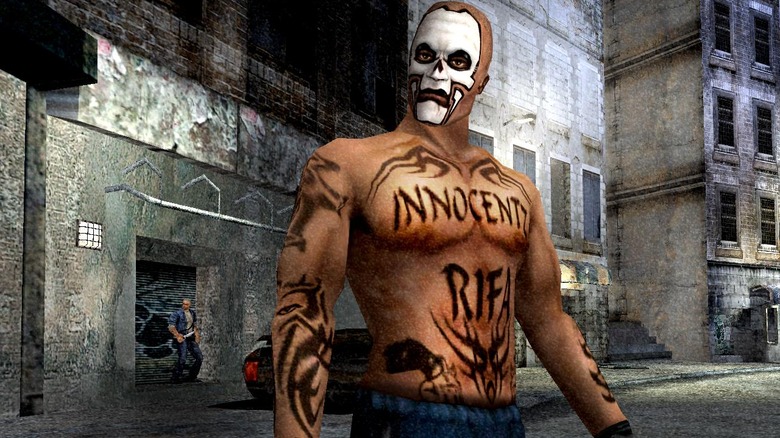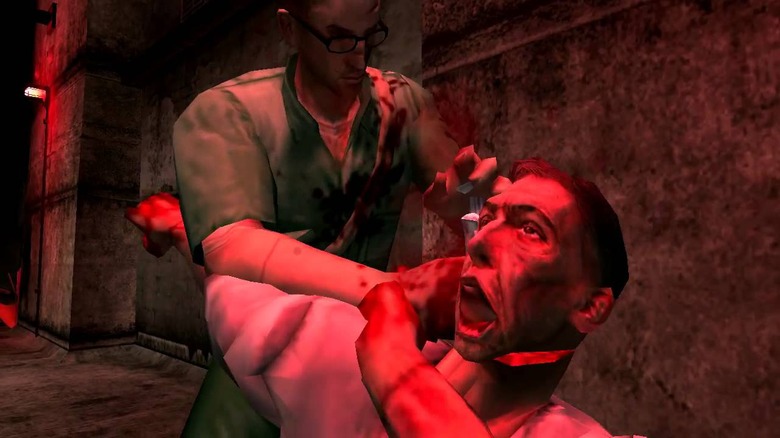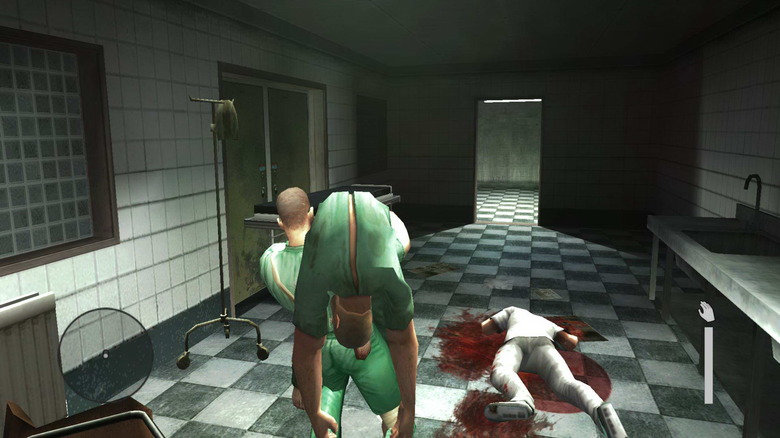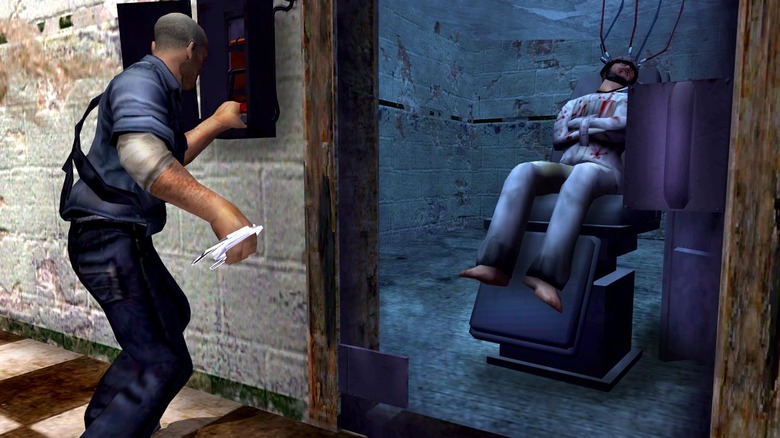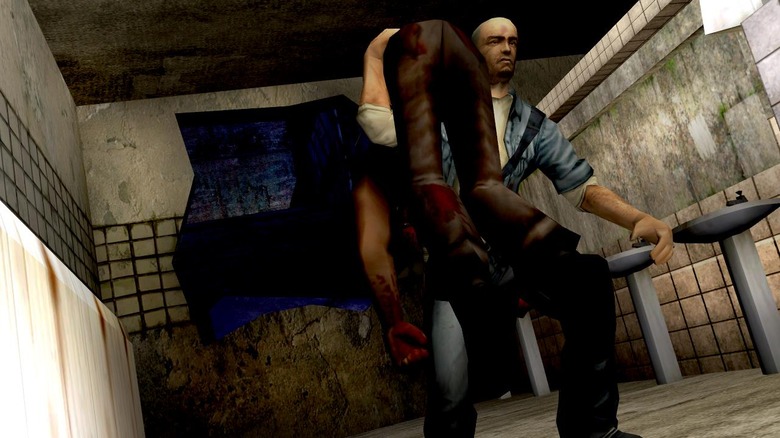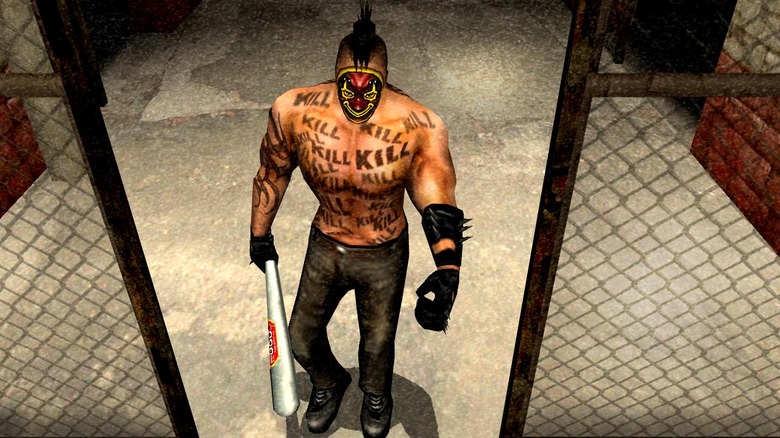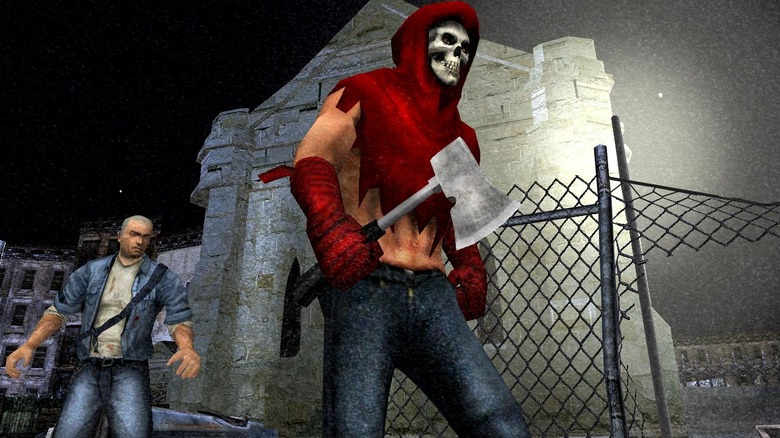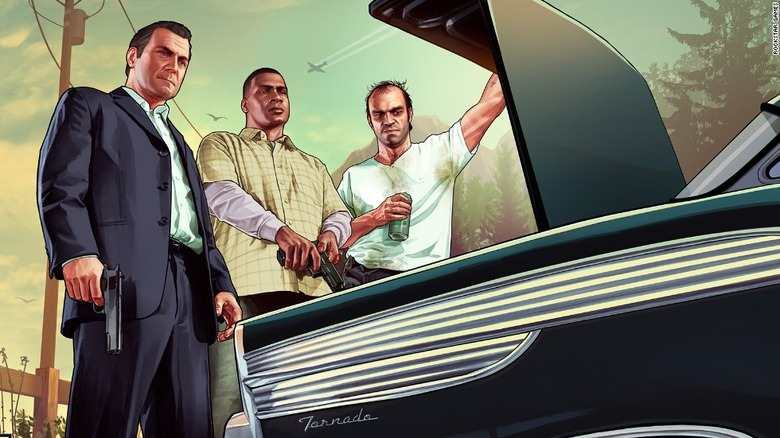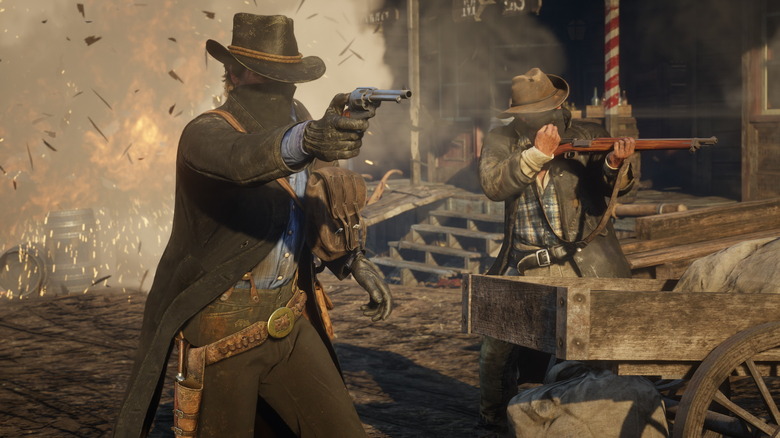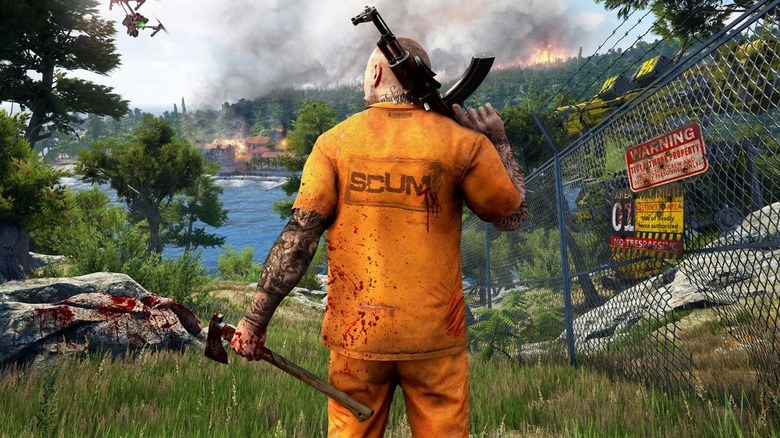Why Manhunt 3 Will Never Happen
The early 2000s was a golden age for Rockstar Games. In 2001, Rockstar put out Grand Theft Auto 3, which, at the time, was hailed as "Rockstar's greatest achievement" by IGN. That same year, Rockstar published Remedy Entertainment's Max Payne for consoles. It was another critical success that further solidified Rockstar as a major player in the video game industry.
With the success of both of these titles, Rockstar did what most entertainment companies would do: greenlight and release sequels. The publisher cranked out Grand Theft Auto: Vice City and Max Payne 2: The Fall of Max Payne in 2002 and 2003, respectively. But while Rockstar was busy building up two of its biggest franchises, it was also working on another project, one that was far more controversial and gruesome than the stylized ultra-violence of GTA and Max Payne: Manhunt.
Developed by Grand Theft Auto studio Rockstar North, Manhunt was released in 2003. A game about a convict trapped in a twisted director's snuff film, Manhunt sent shockwaves through the mainstream almost immediately, sparking renewed conversations over video game violence, and it was even the subject of proposed legislation in US Congress to fine those who sold "adult-themed games to players younger than 17."
Today, the game is lauded by some as a visceral examination of violence in media. Some even regard Manhunt as "one of the GTA studio's very best." But this reexamination probably isn't enough to set Rockstar to work on Manhunt 3. Here's why.
The last Manhunt game faced tons of controversy
Rockstar had a very difficult time releasing Manhunt 2 in 2007. The studio hit a wall due to the sequel's extreme violence, which prompted the ESRB to give it an AO rating, making it difficult to sell the game in stores or publish it on any platforms.
In order to achieve an M rating, Rockstar had to go back and censor the game. Project Manhunt, a website devoted to the series, has chronicled all the different ways Manhunt 2 was censored before its release. Major changes include blurring out execution scenes so that the violence was only insinuated but not actually seen. Certain ways to execute enemies in the game were removed, including several ways to decapitate players as well as the use of pliers to castrate NPCs and perform other gruesome mutilations.
Even after Rockstar cut down on the game's most extreme forms of violence, it still had a really hard time publishing the game in the UK, where the title was banned until a year after its US release. To make matters worse, just days after the US release, hackers were able to remove the blurring effect from executions, reinstating Rockstar's original, gory vision. Just a month after the US release, a group of senators that included Hillary Clinton also sent a letter to the ESRB asking the ratings board to reinstate the game's AO rating.
The point is that Manhunt 2 caused so much trouble for Rockstar that it's unlikely that the company would ever revisit the series.
Manhunt 2 had a tepid reception
The cuts made to Manhunt 2 might have helped its troubled release, but they didn't earn the game a warm reception. The game currently holds a 67/100 on review aggregate site Metacritic, signifying "mixed or average" reviews.
IGN noted in its review that the sequel didn't reach the heights of the original: "Manhunt 2 isn't the tour de force title that will grab your attention and keep you there like the first one did."
"The game looks even worse than its predecessor. The locations and characters are just weirdly generic in comparison," 1UP said in its far more critical review. "Really, the game warrants a 4 because it's technically playable and, despite its best efforts, probably won't plunge the industry into a period of navel-gazing and political sanction. Everything else about it is largely forgettable."
With a much weaker reception than its predecessor, Manhunt 2 might have killed the franchise's chances of ever getting another installment. Certainly, Rockstar wouldn't want to risk putting out another mediocre product in order to please the censors.
Why bother?
Rockstar isn't a company generally known for compromising its vision in order to please a wider audience of gamers (or their parents). The company's output since 2001 has usually targeted adults, from the cold-blooded, open-world Western Red Dead Redemption, to all the Grand Theft Auto games with their street-level shootouts, frequent trips to strip clubs, and other indulgences usually credited to movie gangsters.
That's what makes the Manhunt 2 controversy all the more remarkable. Rockstar, unable to convince the ESRB to award the game with an M rating, saw itself forced to censor Manhunt 2, therefore straying from its violent original vision. Rockstar had to delay the game from its original July 2007 release date to October to accommodate the additional work needed to earn an M rating.
Judging from the fact that Rockstar hasn't rushed to make another Manhunt game in recent years, the company has probably recognized that it can make (and save) a lot more money sticking to the parameters of an M rating. The massive sales success of both Grand Theft Auto 5 and Red Dead Redemption 2 proves that Rockstar doesn't need to rock the boat or challenge what can be depicted in games to make a product consumers are willing to spend tons of money on. If Rockstar doesn't need to cross the line anymore, why should it? If it's not willing to cross the line, Manhunt 3 doesn't really have a reason to exist.
Linear games like Manhunt aren't as popular anymore
While Grand Theft Auto 3's open-world approach was still rare in 2001, open-world titles are much more the norm in 2018. There are plenty more open-world titles to choose from on current-gen consoles than there ever were in the days of the PlayStation 2, which still leaned heavily on linear experiences, including Manhunt.
Manhunt's story is comprised of levels called "scenes," each of which must be completed in order to progress to the next, not leaving much room for the game's protagonist to stray from the designated path. According to at least one publisher, Electronic Arts, this linear approach just isn't as popular with gamers anymore. Speaking at a conference in 2017, EA CFO Blake Jorgensen shared that "people don't like" linear games "as much today as they did five years ago or ten years ago."
While it's true that not all publishers necessarily agree with EA's opinion, there's no denying that the industry has seen a shift from linear to open-world games in the last few years. For that matter, Rockstar hasn't released a linear title since 2012's Max Payne 3. With the massive success of Grand Theft Auto 5 and Red Dead Redemption 2 (both open-world experiences), the company might see no reason to make another linear game.
"Most" Rockstar employees didn't want to work on Manhunt
Parents and censors weren't the only ones worried about the graphic violence depicted in Manhunt. In fact, according to at least one former employee, some of Rockstar's own workers weren't happy about the game. According to Jeff Williams, a web producer at the company at the time, this caused a bit of friction at Rockstar. Williams wrote in a now-deleted blog post (via Games Radar) of his dissatisfaction with the project.
"It may sound surprising, but there was almost a mutiny at the company over [Manhunt]. It was Rockstar North's pet project — most of us at Rockstar Games wanted no part of it," Williams said. "We'd already weathered plenty of controversy over GTA 3 and Vice City — we were no strangers to it — but Manhunt felt different."
Williams says that Manhunt "made us all feel icky. It was all about the violence, and it was realistic violence. We all knew there was no way we could explain away that game. There was no way to rationalize it. We were crossing a line."
While this is, of course, only one person's account of the game's development, it stands to reason that more than one employee was probably taken aback by Manhunt's more visceral moments (especially all of the ones involving chainsaws and decapitation). Might the fact that some employees probably felt uncomfortable with working on something so violent be yet another reason why Rockstar is in no hurry to make another Manhunt game?
Rockstar doesn't put studios on smaller projects anymore
As noted by Jeff Williams above, Manhunt was the brainchild of one specific Rockstar studio, Rockstar North, the team behind the Grand Theft Auto series. Written by Rockstar North video game scribes James Worrall, Alan Davidson, and Christian Cantamessa, Manhunt was spearheaded by this team while other Rockstar studios worked on projects like The Warriors (Rockstar Toronto), Midnight Club 2 (Rockstar San Diego), Red Dead Revolver (Rockstar San Diego), Bully (Rockstar Vancouver), and others.
While this multi-studio structure allowed Rockstar to develop multiple new projects at once (while still releasing new Grand Theft Auto games), things have changed within the company. All Rockstar studios collaborated on Grand Theft Auto 5, creating a development team of over 1,000 people for the open-world crime game. The same happened with Red Dead Redemption 2, which is actually credited to Rockstar Studios, an umbrella for all the company's teams.
"That's the way we work now: everyone works on GTA, or Red Dead, and so on, then we move on to the next thing," former Rockstar North head Leslie Benzies said of GTA 5's development in an interview with MCV.
Since GTA Online is still being maintained and Red Dead Online up and running, it stands to reason that Rockstar Studios won't be pivoting to anything else any time soon, especially a smaller franchise like Manhunt.
Rockstar doesn't need to work on less popular franchises
Even if all of these other factors weren't an issue, one question still remains: why should Rockstar work on a less popular, more niche franchise when it can rake in tons of money making Grand Theft Auto and Red Dead games? The incentive just isn't there.
In April 2018, it was revealed that Grand Theft Auto 5 had become the most profitable entertainment product of all time, with 90 million units sold across the globe and $6 billion in revenue, according to MarketWatch. In May, it was reported that GTA 5 was only 5 million units away from a record 100 million units sold.
In November 2018, a little under two weeks after the game's release, Red Dead Redemption 2 had already shipped 17 million units — that's more than all of the first game's sales — according to Polygon. Additionally, the game had raked in $725 million in sales in its first three days on shelves.
Rockstar knows that there's a lot of money to be made between these two franchises and won't likely stray to far from them any time soon, especially when it can continue to support GTA Online and Red Dead Online with new DLC and make tons of money off the microtransactions. The company doesn't need Manhunt.
Rockstar's bread and butter is shifting to live services over linear games
Part of GTA 5's massive success undoubtedly has something to do with GTA Online's ability to entice players to spend more money on the multiplayer even after they've finished the game's long story mode. The success of GTA Online's "recurrent consumer spending" business model, as Take-Two Interactive CEO Strauss Zelnick calls it (via Gamesindustry.biz), has made way for a new strategy at Rockstar, which unsurprisingly announced Red Dead Online earlier in 2018. According to Zelnick, Take-Two, which is Rockstar's parent company, wants to put "recurrent consumer spending options" (read: more DLC, live services, and microtransactions) into its games.
"We aim to have recurrent consumer spending options for every title that we put out at this company," Zelnick said during an investor call.
In so many words, Zelnick explained that players have welcomed the live service approach, which prolongs the gaming experience well beyond the once-traditional finite Rockstar single-player game. "The business that once upon a time was a big chunky opportunity to engage for tens of hours or perhaps 100 hours has turned into ongoing engagement, day-after-day, week-after-week. You fall in love with these titles and they become part of your daily life."
This is a pretty damning development for the Manhunt series, which has so far appeared as a linear, finite experience that doesn't really entice players to spend more than the allotted hours to finish the story. It doesn't sound like a post-GTA Online Rockstar will be making a game like that ever again.
Battle royale and survival games already continued the Manhunt concept
While the Manhunt concept — that of a man trying to survive a gauntlet of killers in order to be the last man standing — was more of a rarity in 2003, that's not really the case anymore. Battle royale and survival games have taken up that concept and added more complexity and online multiplayer to it.
The popular PlayerUnknown's Battlegrounds, for example, drops 100 players on a map with no weapons or equipment. The player's mission is simple: kill every other player in the game by any means necessary until you're the last man standing. That, in essence, was the story of Manhunt, as James Earl Cash made his way through the twisted world of director Lionel Starkweather's snuff film, fashioning anything he could find into a murder weapon.
Open-world survival game SCUM and battle royale game The Culling also borrow aspects from Manhunt. In SCUM, prisoners are transferred to an island facility and made to survive against other prisoners as part of a dystopian reality television show — not unlike the snuff film setup of Manhunt's story. The Culling even puts a voice in your ear while playing in the form of an announcer, who sort of emulates the twisted directions from Starkweather, who speaks to you throughout Rockstar's game.
In other words, several games (or perhaps we should say "whole genres") have come out in the years since the last Manhunt title that scratch the murderous itch left behind by Rockstar's most controversial series. Manhunt would probably be seen as redundant today.

